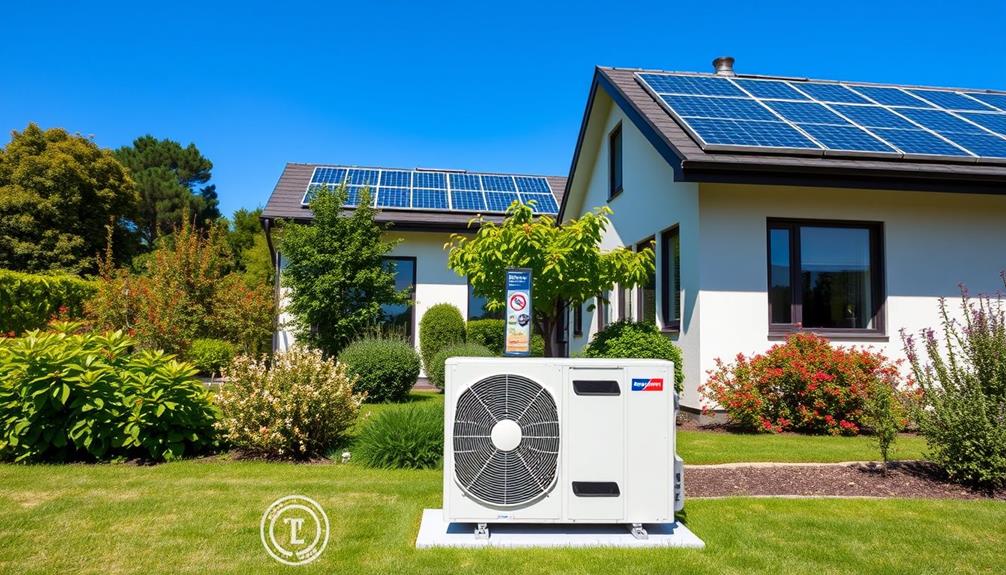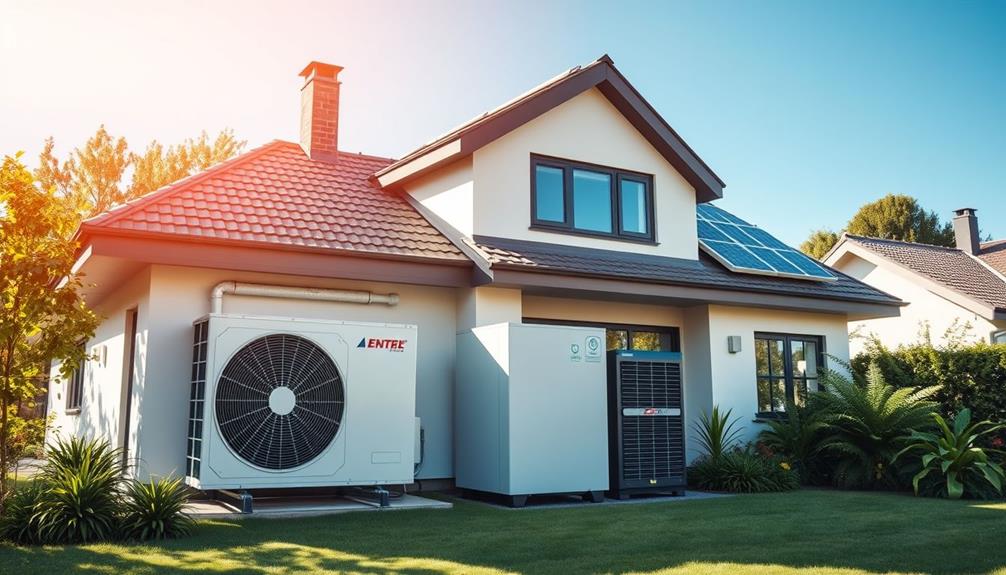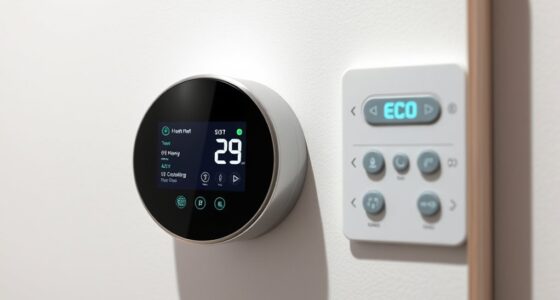Heat pumps play an essential role in reducing carbon footprints by efficiently transferring heat for heating and cooling. They can achieve energy efficiencies between 300% and 500%, meaning they produce more energy than they consume. By switching to heat pumps, you could cut your energy bills and lower greenhouse gas emissions by up to 70% compared to traditional systems. In areas with cleaner electricity sources, emissions can drop even further. With the potential to greatly impact climate change, heat pumps are an eco-friendly choice worth considering. You'll discover more about their benefits and future trends as you explore further.
Key Takeaways
- Heat pumps can reduce greenhouse gas emissions by over 50% compared to conventional gas heating systems, aiding in carbon footprint reduction.
- With efficiency ratings of 300-500%, heat pumps consume significantly less energy than traditional heating methods, leading to lower overall emissions.
- Integrating heat pumps with cleaner electricity sources can increase emissions reductions up to 80%, enhancing their environmental benefits.
- Widespread adoption of heat pumps could result in an annual emissions reduction of 160 million metric tonnes by 2032 in the U.S.
- Transitioning to heat pumps can save households around $500 annually on energy bills, making them economically viable while reducing carbon footprints.
Overview of Heat Pumps
Heat pumps have become a game changer in heating and cooling solutions. These versatile systems can provide both heating and cooling by transferring heat from air, ground, or water sources. Understanding thermal energy transfer basics is essential to optimize their performance.
You'll find that heat pumps are energy-efficient alternatives to traditional heating methods, achieving efficiency ratings of 300-500%. This means they can produce three to five times more energy than they consume, making them a smart choice for your home or business.
As global sales of heat pumps surged by nearly 15% in 2021, their capacity is projected to nearly double by 2030, highlighting their growing popularity. They're especially effective in colder climates, with advancements allowing operation even at temperatures as low as -15°F. By incorporating heat pumps into your heating and cooling systems, you can greatly lower energy consumption.
Moreover, heat pumps play an important role in reducing greenhouse gas emissions. Studies show potential reductions of up to 70% when replacing conventional heating systems.
Mechanism of Heat Transfer
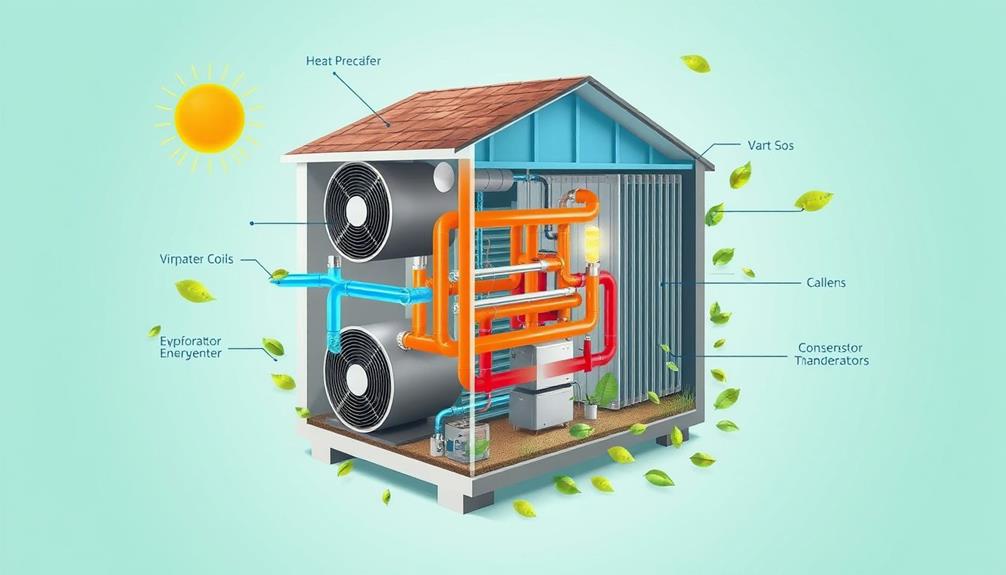
Operating through a refrigeration cycle, heat pumps efficiently transfer heat by utilizing the evaporation and condensation of refrigerants. This clever mechanism allows you to enjoy both heating and cooling without excessive energy use.
By implementing heat pumps, you can also align your energy consumption with strategies to reduce carbon footprints and enhance energy efficiency. Here's how it works:
- Heat Absorption: In heating mode, the refrigerant absorbs heat from external sources like air, ground, or water.
- Compression: The refrigerant is then compressed, which raises its temperature considerably.
- Heat Release: This heated refrigerant is circulated indoors, releasing heat and warming your space.
- Reversal for Cooling: When cooling, the process reverses; the heat pump extracts heat from your indoor air and releases it outside, lowering the temperature inside.
The efficiency of heat pumps is impressive, often measured by their coefficient of performance (COP). They can achieve 300-500% efficiency compared to traditional heating methods.
This means for every unit of energy you put in, you receive multiple units of heat, making heat transfer not only effective but also eco-friendly.
Energy Efficiency Benefits
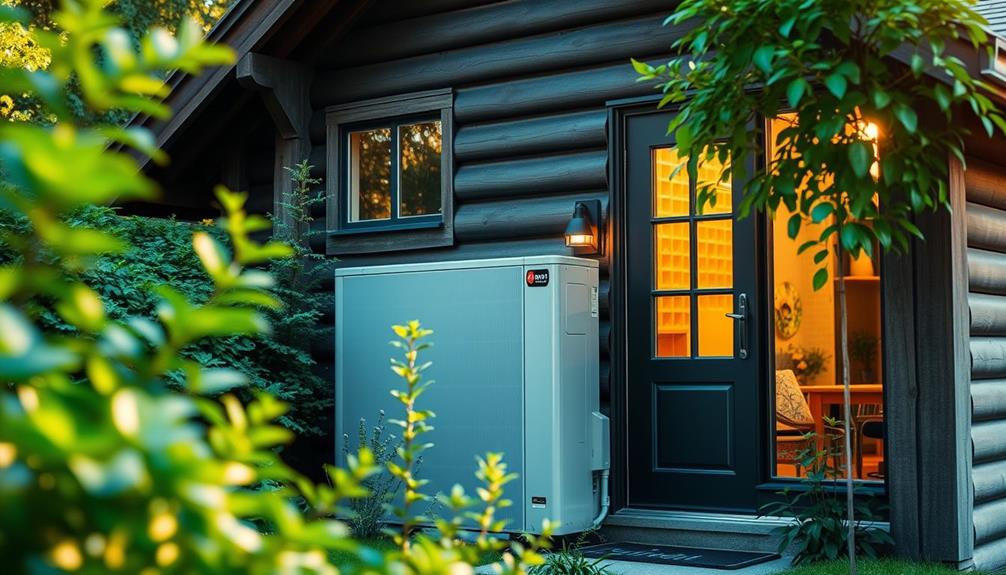
By implementing heat pumps, you'll access considerable energy efficiency benefits that go beyond just comfort. These systems can achieve an incredible efficiency of 300-500% compared to traditional gas furnaces. This means you can greatly reduce your energy consumption for both heating and cooling, leading to substantial cost savings. Households currently using electric resistance or fossil fuels can save around $500 annually by switching to heat pumps.
Here's a quick comparison of energy efficiency:
| System Type | Efficiency | Annual Savings |
|---|---|---|
| Traditional Gas Furnace | 80-90% | – |
| Natural Gas Boiler | 70-90% | – |
| Heat Pumps | 300-500% | $500 |
| Electric Resistance | 100% | – |
The adoption of heat pumps has also proven essential in reducing carbon emissions. For instance, in the UK, heat pumps have contributed to an 18% drop in CO2 emissions since 1990. Shifting to heat pumps not only enhances energy efficiency but also plays an important role in minimizing your carbon footprint, making it a smart and eco-friendly choice.
Heat Pumps and Emissions Reduction
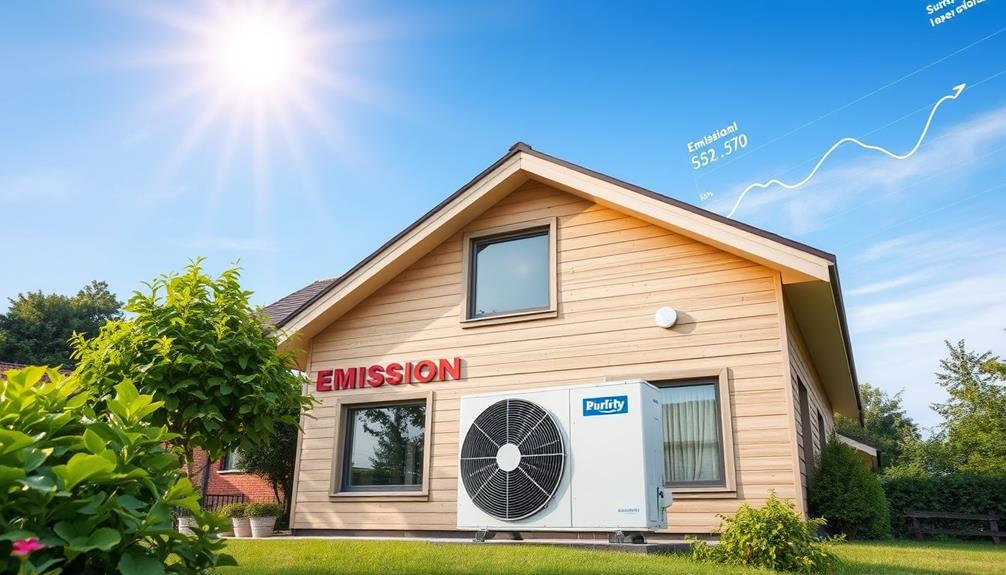
When you switch to a heat pump, you're not just improving your home's efficiency; you're also contributing to significant global emissions reductions.
Compared to gas heating systems, heat pumps can cut emissions by over half, making them a smart choice for the environment.
Additionally, the use of geothermal energy in heat pumps can further enhance their effectiveness in reducing carbon footprints, as it harnesses the Earth's natural heat utilizes Earth's heat.
Efficiency Compared to Gas
Heat pumps stand out as a powerful alternative to traditional gas furnaces, boasting an impressive efficiency range of 300-500%. This remarkable efficiency means you can greatly reduce your overall energy consumption and associated emissions.
Additionally, heat pumps often integrate advanced technology that enhances their operation, making them comparable to modern garage door openers regarding energy efficiency. Shifting to heat pumps can have a profound impact on your carbon footprint.
Here are some key points to reflect upon:
- Heat pumps can reduce emissions by 55% compared to gas boilers.
- In areas with cleaner electricity sources, emissions from heat pumps can be slashed by up to 80%.
- Approximately 98% of U.S. households can benefit from installing heat pumps to lower their carbon emissions.
- By 2032, a change to heat pumps could result in an annual emissions reduction of 160 million metric tonnes.
These figures underscore the effectiveness of heat pumps in mitigating climate change. By tapping into their high efficiency, you not only save on energy bills but also play a crucial role in reducing your environmental impact.
Embracing heat pumps is a practical step toward a more sustainable future, making them an essential consideration for anyone looking to lessen their emissions.
Global Emissions Reduction Potential
There's a growing recognition of heat pumps as a key player in the fight against climate change. Their emissions reduction potential is significant, with studies suggesting they could cut global CO2 emissions by half a gigatonne by 2030.
By switching from traditional gas boilers to heat pumps, you could achieve up to a 55% reduction in emissions, highlighting their effectiveness in lowering greenhouse gas outputs. Additionally, heat pumps can enhance energy efficiency, potentially lowering energy bills and providing a diversification of retirement portfolio for households looking to invest in sustainable technology.
In fact, around 98% of U.S. households can benefit from installing heat pumps, making them a versatile solution for various living situations. If more households made this change, we could see an annual emissions reduction of 160 million metric tonnes by 2032, underscoring their role in climate change mitigation.
Moreover, heat pumps can lower emissions by at least 20% compared to gas boilers, and when paired with cleaner electricity sources, this reduction could soar to as much as 80%.
The evidence is clear: embracing heat pumps is a practical step toward reducing global emissions. You have the power to make a difference by choosing heat pumps and contributing to a more sustainable future.
Case Studies in Carbon Footprint Reduction
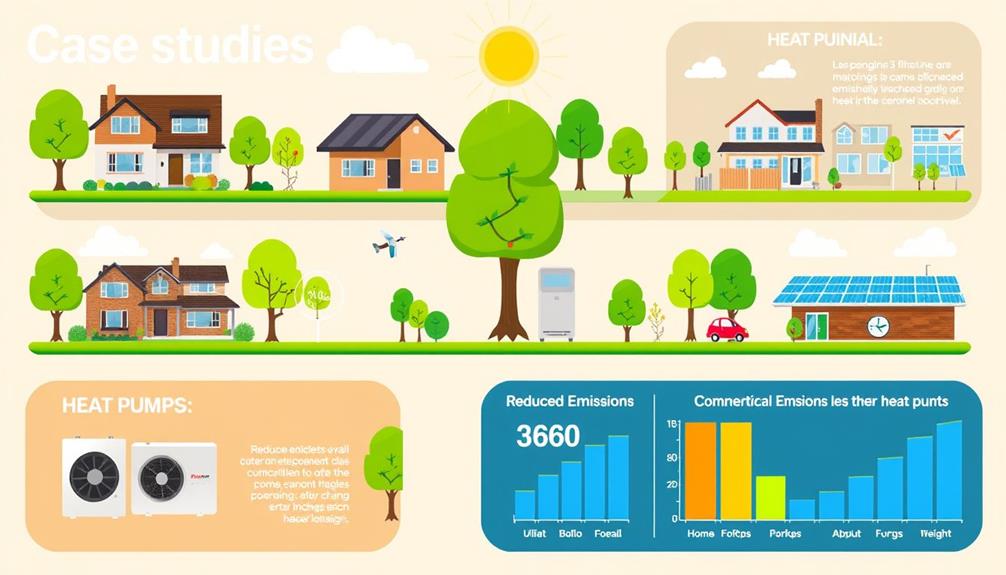
Shifting to heat pumps has proven to be a game-changer in reducing carbon footprints across various regions.
The integration of renewable energy sources and efficient heating technologies is vital for achieving sustainability goals, and heat pumps play a significant role in this transformation, as seen in the diversification of retirement portfolio discussions.
You'll see the impact firsthand through several compelling case studies that highlight heat pump adoption and its role in emissions reductions:
- UK Progress: Since 1990, the UK has experienced an 18% decrease in CO2 emissions, largely attributed to heat pump integration in residential heating systems.
- US Potential: An analysis indicates that switching 30% of single-family homes in the United States to heat pumps could save around 160 million metric tonnes in carbon emissions annually by 2032.
- EU Strategy: The deployment of heat pumps in the EU is expected to slash natural gas consumption by 21 bcm by 2030, reducing the carbon footprint tied to heating.
- Cleaner Electricity: Research shows heat pumps can achieve emissions reductions of at least 20% compared to traditional gas heating. When paired with cleaner electricity sources, this reduction can soar up to 80%.
These case studies underscore the effectiveness of heat pumps in achieving significant emissions reductions and reducing overall carbon footprints.
It's clear: heat pump adoption is essential for a sustainable future.
Economic Implications of Heat Pumps
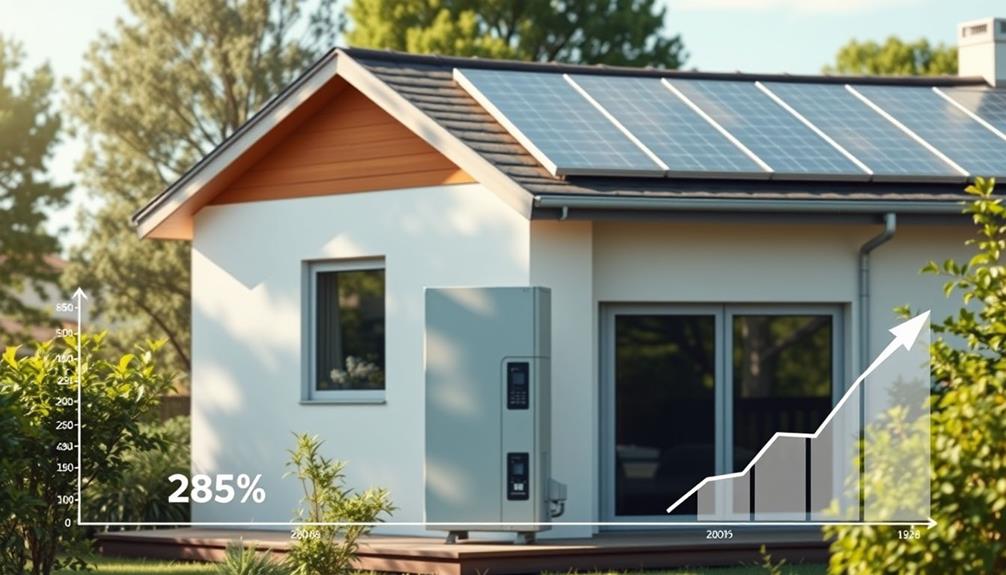
With rising energy costs and increasing awareness of climate change, the economic implications of adopting heat pumps are becoming more significant. While the initial installation costs for heat pumps may be higher than traditional heating systems, you'll likely see long-term energy savings that can offset those expenses. In fact, by switching from electric resistance or fossil fuels, you could save around $500 annually on energy bills.
Additionally, utilizing heat pumps can lead to reduced reliance on fossil fuels, aligning with the benefits of gas appliances functionality during outages during emergencies.
Moreover, if 30% of single-family homes in the U.S. shift to heat pumps, it could lead to substantial savings of $600 million in health damages and $1.7 billion in climate damages each year. Various incentives and rebates are available to enhance the economic viability of heat pumps, making them even more appealing.
Furthermore, the maintenance costs for heat pumps are generally lower compared to combustion-based systems, contributing to their cost-effectiveness over time.
In regions where natural gas prices are rising, heat pumps gain an operating-cost advantage, increasing their competitiveness against fossil fuel heating options. Investing in heat pumps not only supports your wallet but also contributes to a healthier environment, making it a smart economic choice.
Integration With Renewable Energy
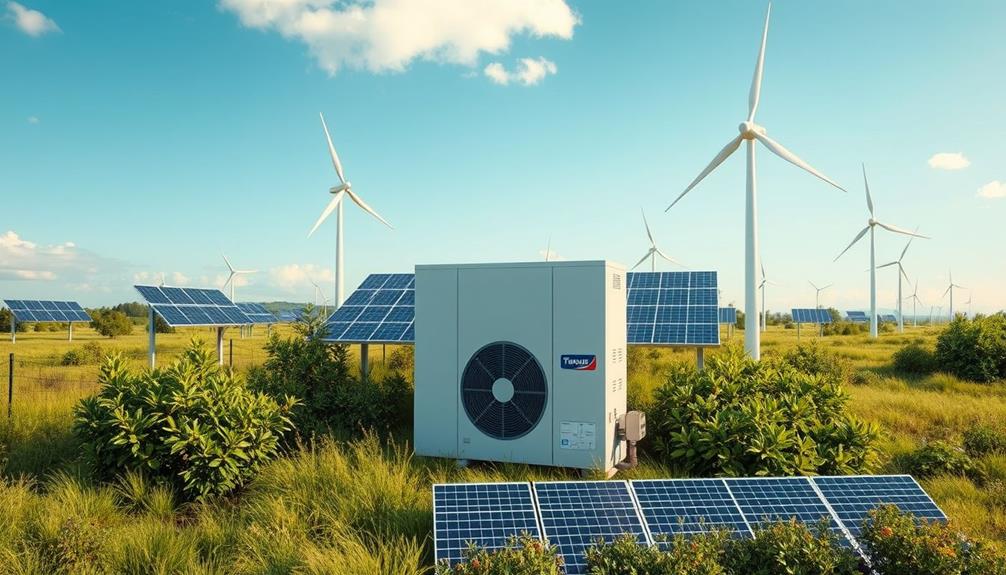
Adopting heat pumps not only offers economic benefits but also aligns perfectly with the growing emphasis on renewable energy sources. By harnessing external energy, such as solar or wind, heat pumps enhance energy efficiency and contribute to a sustainable future.
Air purifiers can also enhance indoor air quality by reducing pollutants, making environments healthier. Here's how they integrate seamlessly with renewable technologies:
- Maximized Efficiency: Heat pumps convert renewable energy sources into useful heat, greatly boosting system efficiency.
- Solar Thermal Storage: When combined with solar thermal energy storage, heat pumps can dramatically reduce primary energy consumption in both homes and businesses.
- Lower Energy Demand: With a high coefficient of performance (COP), heat pumps can effectively lower overall energy demand, paving the way for a low-carbon energy system.
- Smart Technology Integration: Many heat pumps now feature smart technology, allowing for optimized operation that adapts to fluctuating renewable energy generation.
Challenges in Heat Pump Adoption
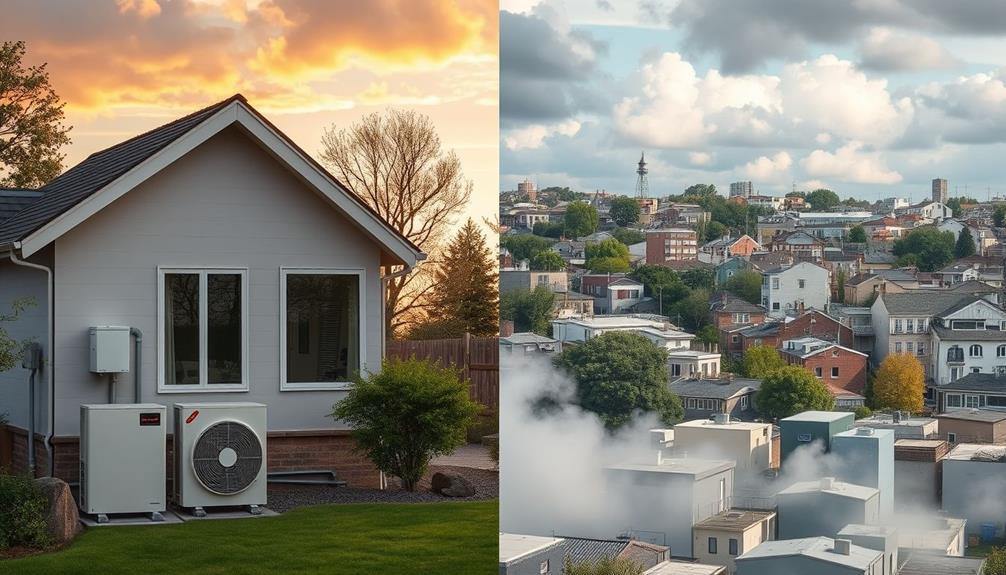
The challenges in heat pump adoption can often feel intimidating for homeowners considering this technology. While heat pumps offer significant long-term benefits, several barriers can make you hesitate.
| Challenge | Description | Impact on Adoption |
|---|---|---|
| Space Requirements | Heat pumps are larger than traditional boilers. | Limited installation options. |
| Upfront Costs | Higher initial costs compared to conventional systems. | Financial strain for homeowners. |
| Performance in Cold | Less effective in extremely cold temperatures. | Requires improved insulation. |
| Insulation Upgrades | May necessitate costly insulation enhancements. | Politically sensitive costs. |
| Limited Awareness | Public knowledge about heat pump benefits is low. | Slows down widespread adoption. |
These challenges can lead to hesitation, especially regarding upfront costs. Despite potential long-term savings on energy bills, the initial investment is a significant factor. Additionally, the need for adequate insulation and the larger space requirements can complicate the installation process. Without proper public awareness and infrastructure changes, the shift to heat pumps may remain slow. Addressing these issues is essential for increasing adoption rates and ultimately reducing carbon footprints.
Future Trends and Innovations
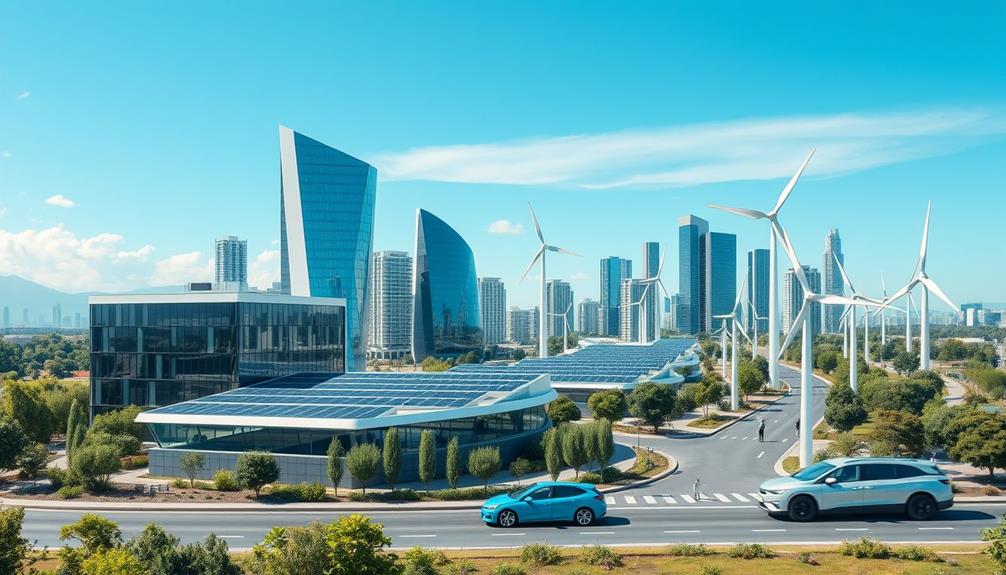
As you look ahead, you'll notice that heat pumps are becoming more efficient each year, thanks to technological advancements.
These improvements align with the principles of user-centered design, emphasizing the importance of creating solutions that meet user needs.
With smart integration and control, these systems optimize energy use in real-time, making them even more user-friendly.
Innovations like hybrid systems and advanced refrigerants are set to further enhance their performance and sustainability.
Technological Advancements in Efficiency
Leveraging recent innovations, heat pump technology is evolving rapidly, particularly regarding efficiency. You're seeing technological advancements that make these systems more effective than ever, especially in extreme cold climates.
Additionally, integrating Gold IRAs into financial planning can provide a stable investment strategy while enhancing retirement security. Here are some key updates you should know:
- Hybrid Systems: These are now available, combining traditional heating methods with heat pumps for better performance and efficiency.
- Advanced Refrigerants: The development of new refrigerants enhances operational performance while lowering environmental impact.
- Cold Climate Performance: Modern heat pumps can operate effectively at temperatures down to -15°F, making them suitable for harsh winter regions.
- Integration with Renewable Energy: Research into machine learning for solar energy potential is paving the way for improved efficiency when heat pumps are combined with renewable energy sources.
With the average efficiency of heat pumps increasing by about 2% annually, these systems are becoming more capable of converting external energy into usable heat.
Continuous advancements, like hybrid geothermal systems, are showcasing notable economic benefits, especially when paired with excess renewable electricity.
Smart Integration and Control
Integrating smart technology into heat pumps is revolutionizing how you control and monitor your home's heating and cooling systems. With smart technology integration, you can optimize energy usage and enhance efficiency in your HVAC setup.
Advanced algorithms and machine learning are now being developed to predict your energy demand accurately. This means your heat pump can adjust its operations to align with your needs, leading to better energy management and considerably reduced carbon emissions.
Future innovations are focusing on connecting heat pumps with renewable energy sources, allowing for real-time adjustments based on energy availability. By maximizing the use of clean energy, you can further decrease your carbon footprint.
Additionally, smart grid technologies will enable demand response capabilities, allowing your heat pump to operate more efficiently during off-peak hours.
Ongoing research aims to enhance heat pump performance in extreme climates through adaptive control systems. These systems can efficiently manage temperature variations, ensuring comfort while maintaining energy efficiency.
Policy Support for Heat Pumps
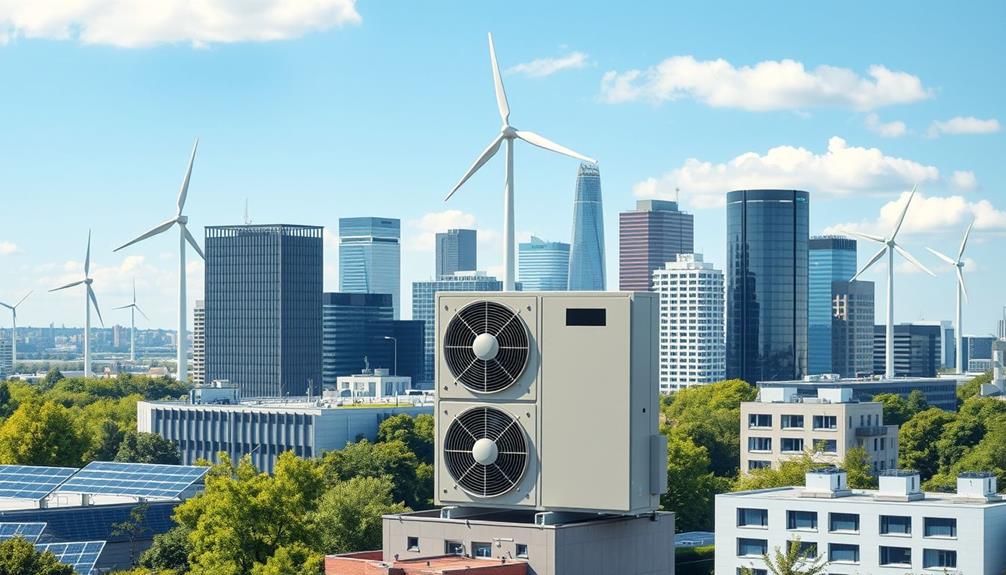
Effective policy support is essential for driving the widespread adoption of heat pumps and reducing carbon footprints. To achieve this, you'll need to pay attention to several key elements:
- Federal incentives: Proposed changes to tax credits and rebate programs can greatly boost heat pump adoption, making them more financially viable for you and your community.
- Efficiency standards: The new minimum efficiency standards effective from January 1, 2023, are designed to enhance market growth and encourage installations of high-performing heat pumps.
- State-level programs: Initiatives like those in Massachusetts and New York offer financial incentives for replacing fossil-fuel heating systems, improving affordability and accessibility for households.
- Regulatory frameworks: Cities like Denver and Boston have implemented stricter energy efficiency and emissions requirements, which expedite the shift to heat pumps, ensuring you have cleaner alternatives.
Collaborative efforts among government, industry, and consumers are vital.
Frequently Asked Questions
Do Heat Pumps Reduce Your Carbon Footprint?
Yes, heat pumps do reduce your carbon footprint. By replacing traditional heating systems, they lower emissions considerably, achieving higher efficiency levels. You'll notice a positive environmental impact while enjoying cost savings on energy bills.
How Do Heating Systems Contribute to Carbon Footprint?
Heating systems contribute to your carbon footprint by relying on fossil fuels, which release significant CO2 emissions. When you use gas or oil for heating, you're adding to global greenhouse gas levels and climate change.
How Does a Heat Pump Help the Environment?
Did you know heat pumps can cut greenhouse gas emissions by up to 70%? By switching to a heat pump, you'll not only lower your carbon footprint but also enhance air quality, benefiting both you and the environment.
What Is the Role of Heat Pumps in Decarbonisation?
Heat pumps greatly contribute to decarbonization by replacing traditional heating methods, reducing greenhouse gas emissions, and improving energy efficiency. By choosing heat pumps, you're directly supporting a sustainable future and minimizing your environmental impact.
Conclusion
To sum up, heat pumps are like a welcome change for our planet, offering a powerful way to cut carbon footprints. By harnessing efficient heat transfer, they not only save energy but also greatly reduce harmful emissions. As we embrace renewable energy sources and tackle adoption challenges, the future looks promising for these innovative systems. With the right policy support, heat pumps can lead the charge toward a more sustainable and eco-friendly world.
